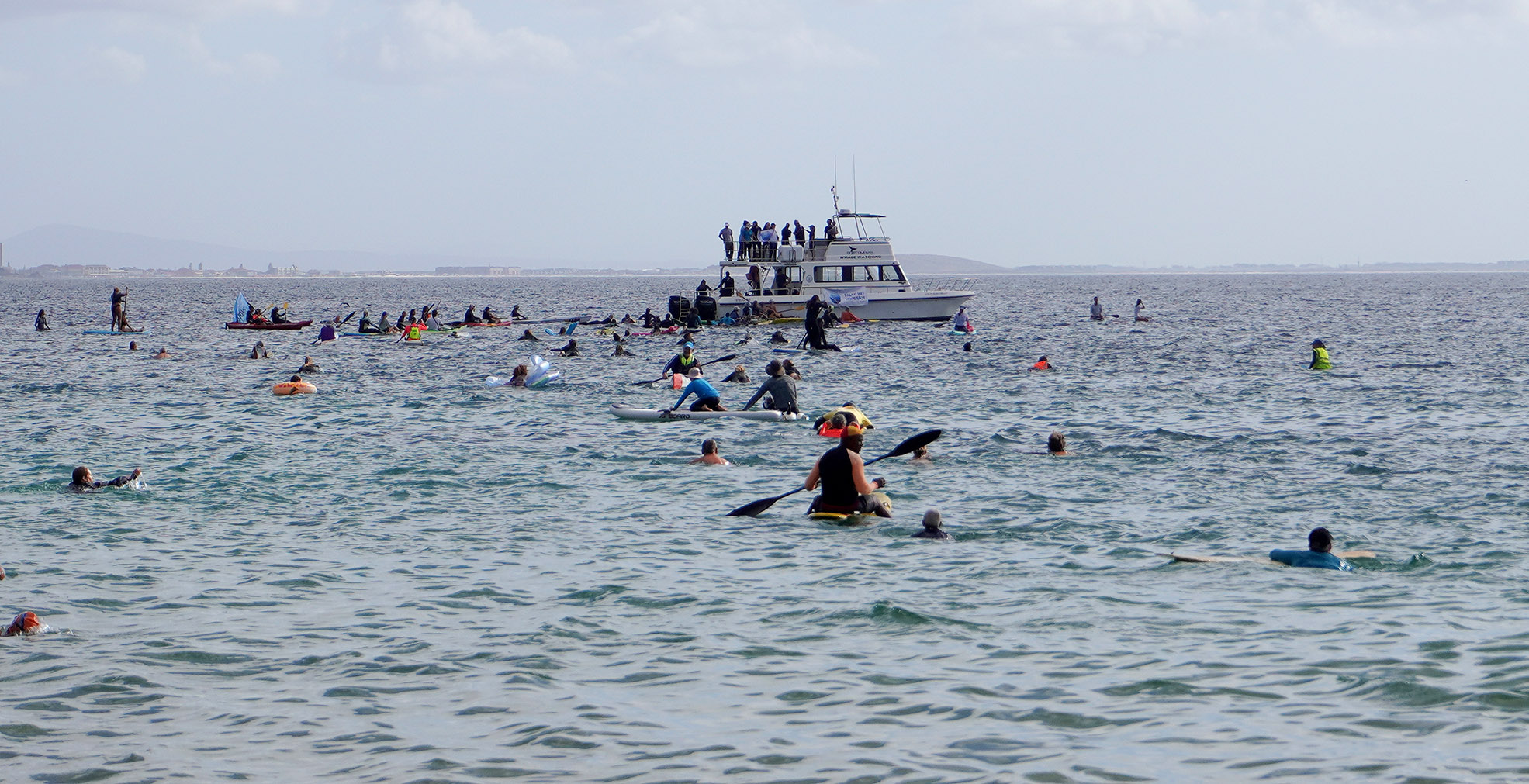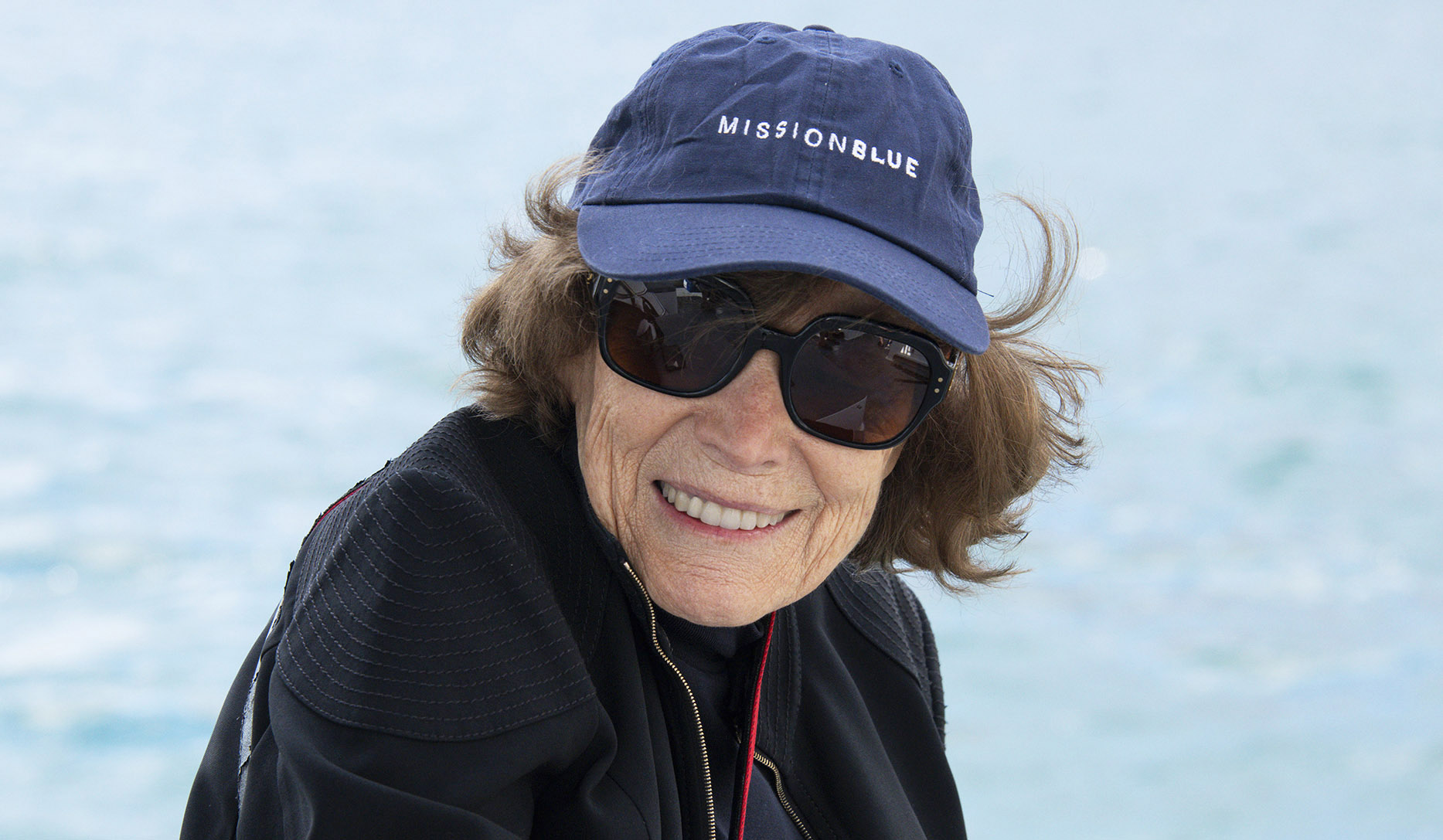If you’re not familiar with Mission Blue, it’s a global initiative to protect the ocean spearheaded by Dr Sylvia Earle, and brings together an international coalition to inspire an upwelling of public awareness, access and support for a worldwide network of marine protected areas called Hope Spots.
During an interview with Daily Maverick in Cape Town this past week, Earle – who is acknowledged as a pioneer in the preservation and rehabilitation of seas – highlighted the necessity of collective action and policy changes to protect the ocean and its marine life.
Hope Spots are critical to the health of the oceans. Some are already formally protected, while others still need defined protection. Under Earle’s leadership, the Mission Blue team has embarked on a series of expeditions illuminating these vital ecosystems.
Earle’s Netflix Original documentary, Mission Blue, tells the story as she travels the globe on an urgent mission to shed light on the dire condition of Earth’s oceans.
Earle told Daily Maverick: “Imagine if we did not know what the problems are. We now have the best chance ever to reverse the trajectory.”
She added that while humans were the cause of so many of the issues and threats facing the ocean, they were also the cure.
https://www.youtube.com/watch?v=B1wp2MQCsfQ&ab_channel=Netflix
“What we do now or what we fail to do right now in the 21st century will have an impact of either securing a long and enduring place for ourselves within the natural systems that make earth habitable, or we will lose the chance and our fate will be like the fate of so many other species that ultimately just slip into infinity.
“It doesn’t look like it’s going to happen soon because there are now 8 billion people, but things can turn very quickly … It took four and a half decades to get to this safe place where Earth works in our favour and to significantly shift the odds. We’re altering the nature of nature, at our peril. Our actions are altering the climate and altering the water systems of the world. We have already lost so much wildlife … but we can keep what we’ve got,” Earle said.
 On 10 February 2024, ocean lovers from the Cape joined world-renowned marine biologist and oceanographer Dr Sylvia Earle for snorkelling activities and a Paddle Out from Long Beach in Simon’s Town to celebrate the False Bay Hope Spot. (Photo: David Hurwitz)
On 10 February 2024, ocean lovers from the Cape joined world-renowned marine biologist and oceanographer Dr Sylvia Earle for snorkelling activities and a Paddle Out from Long Beach in Simon’s Town to celebrate the False Bay Hope Spot. (Photo: David Hurwitz)
 On 10 February 2024, ocean lovers from the Cape joined world-renowned marine biologist and oceanographer Dr Sylvia Earle for snorkelling activities and a Paddle Out from Long Beach in Simon’s Town to celebrate the False Bay Hope Spot. (Photo: David Hurwitz)
On 10 February 2024, ocean lovers from the Cape joined world-renowned marine biologist and oceanographer Dr Sylvia Earle for snorkelling activities and a Paddle Out from Long Beach in Simon’s Town to celebrate the False Bay Hope Spot. (Photo: David Hurwitz)
From hope to action
There are two ways that Hope Spots are beneficial. They provide a mechanism to safeguard places and they enable recovery through a process to reach an official designation for protection. Hope Spots don’t necessarily start out with official protection, but they lead to securing official safeguards for those areas.
The other element of Hope Spots is that they are energising, motivating and educating people because, as Earle says, “people are the problem, but they’re also the solution”.
Earle said: “When hope leads to action, then it becomes real. It can happen on a global scale like when nations came together in 1986 to have a moratorium on the commercial killing of whales. Today, there are more whales than there were when I was a child.
“Recovery is possible if you haven’t killed them all. We are seeing more blue whales, more humpback whales, but not all whales have responded to protection because it takes a long time for them to mature and the world is changing around them just as it’s changing around us, and we continue to make things difficult for whales by taking their food, by clogging the ocean with plastic and other debris by poisoning the ocean, which also poisons us as well as whales.”
Earle added that recovery might be easier if we weren’t shifting the nature of the ocean.
“Just the simple thing of not deliberately going out to kill whales for commerce has made a huge difference. Even so, hundreds of thousands of marine mammals are killed, not deliberately, but because they either die from pollution or die from entanglement with discarded fishing nets and other stuff that we put into the ocean.
“We’re the only ones and, since we’re the cause, we are the cure … We must protect the natural systems as if our lives depend on it because they do … Our lives are at risk. The most important thing that we can do is to keep the Earth habitable,” she said.
 Hope Spots are recognised parts of the world’s oceans that are crucial for the wellbeing of our planet's marine ecosystem. The False Bay Hope Spot extends from Cape Point to Cape Hangklip, spanning roughly 30km at its broadest expanse. (Photo: Two Oceans Aquarium)
Hope Spots are recognised parts of the world’s oceans that are crucial for the wellbeing of our planet's marine ecosystem. The False Bay Hope Spot extends from Cape Point to Cape Hangklip, spanning roughly 30km at its broadest expanse. (Photo: Two Oceans Aquarium)
False Bay Hope Spot
Earle recently visited South Africa, which is home to six Hope Spots along its coast: False Bay, the Cape Whale Coast, Knysna, Plettenberg Bay, Algoa Bay and Aliwal Shoal. These areas cover a notable stretch of the South African coast and serve as a launch pad for further ocean conservation in the region.
There are currently 159 Hope Spots around the world that have been scientifically identified as critical to the health of the ocean and are championed by local conservationists whom Mission Blue supports with communications, expeditions and scientific advice.
The False Bay Hope Spot was in the spotlight last week as the Two Oceans Aquarium joined Cape RADD (Research and Diver Development) as a champion of the Hope Spot.
In celebration, Mission Blue hosted a workshop at the Two Oceans Aquarium to highlight the work being done in False Bay and ignite interest in and action around the South African Hope Spots. The event brought together 85 participants from 37 organisations, including I Am Water, the Sea Change Project, Sea the Bigger Picture, the Beach Co-op, the Southern Underwater Research Group, WWF South Africa and the Wild Trust.
The Two Oceans Aquarium’s conservation and sustainability manager, Helen Lockhart, explained that False Bay had a rich marine biodiversity and was home to more than 3,500 endemic species. These included: endangered African penguins; various species of shark, including bronze whalers, shysharks and catsharks; a variety of seabirds such as African oystercatchers, kelp gulls, cormorants; octopus; and many invertebrates.
“It is frequented by white sharks, orcas, southern right whales, and various dolphin species and Cape fur seals. Many species use False Bay as feeding and breeding grounds, as well as nurseries. And, of course, the magnificent kelp forests of False Bay, which provide shelter and food to marine life,” she said.
Some of the work being done in False Bay includes regular beach clean-ups, connecting people to the ocean and showing them that they can be part of the solution in addressing some of the human-caused problems such as litter. Aquarium research teams also conduct projects such as acoustic telemetry tagging on False Bay sharks and rays, and their educators inspire thousands of schoolchildren every year by exposing them to the marine life of False Bay.
Cape RADD founder Mike Barron told Daily Maverick there was an urgent need for climate action, citing ocean acidification, pollution and overfishing as major threats to ocean health, including on the False Bay coast.
According to GroundUp, the City of Cape Town is currently exploring solutions to stop the practice of discharging untreated sewage into the Atlantic Ocean along the city’s coastline. However, its primary sewage treatment facility near Strandfontein is exacerbating pollution in False Bay because of its failure to adequately treat sewage, GroundUp reported.
This is just one ongoing cause of pollution along the False Bay coast that is having a damaging impact on its marine life and overall ocean health, making the need for conservation efforts in False Bay even more necessary.
Barron said: “The message we’re trying to shout about is very difficult, and it’s very easily overlooked and ignored by corporations and industry, unless we can get to policy and legislation level. We’re at a stage now that global warming is raising its voice itself and we can’t ignore it any more.
“I remember when I was a kid, scientists used to say global warming is happening and then it’ll have this massive spiral negative impact on humans. This means melted ice caps, reduced currents, changed movements of weather patterns, intensified storms resulting in extremities beyond human control.
“It’s reaching a tipping point, but that tipping point might just be the wake-up call.”
Lockhart said plastic was one of the big issues Two Oceans staff encountered along South Africa’s entire coast in their work with sea turtles.
“So many of the turtles that come into our rehab facility have ingested plastic. We see it in animal entanglements, ghost fishing gear. In terms of False Bay, yeah, I think the plastic issue is a major one, and then also unsustainable fishing practices.
“One of the big challenges is climate change, and the impact that it’s having on ocean acidification and the changes that are occurring within the kelp forest and animals that we’re seeing there,” she said.
Lockhart said they became very despondent at times. “I’ve been doing this work for 30 years, and we are still talking about the same things and we’re still facing the same challenges. Some challenges are worse in some instances. But there’s no other way; it is about just keeping going and keeping doing the work we do.”
Earle’s vision is that the Earth is a Hope Spot –all of it. What Blue Mission is doing with champions and communities is connecting the dots [spots] to make this network a global network of hope.
“It’s a transition of protecting spaces and species, but overall it’s to change the way we think,” she said. DM
https://www.youtube.com/watch?v=REeWvTRUpMk




 Hope Spots are recognised parts of the world’s oceans that are crucial for the wellbeing of our planet's marine ecosystem. The False Bay Hope Spot extends from Cape Point to Cape Hangklip, spanning roughly 30km at its broadest expanse. (Photo: Two Oceans Aquariam)
Hope Spots are recognised parts of the world’s oceans that are crucial for the wellbeing of our planet's marine ecosystem. The False Bay Hope Spot extends from Cape Point to Cape Hangklip, spanning roughly 30km at its broadest expanse. (Photo: Two Oceans Aquariam) 